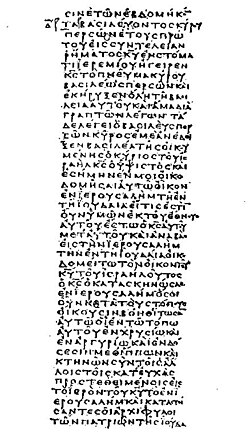
Back Septuagint Afrikaans الترجمة السبعينية Arabic سبعينيه ARZ Septuaginta AST Septuaginta Azerbaijani Septuaginta BAR Септуагінта Byelorussian Сэптуагінта BE-X-OLD Септуагинта Bulgarian সপ্ততি Bengali/Bangla
| Septuagint | |
|---|---|
 Fragment of a Septuagint: A column of uncial book from 1 Esdras in the Codex Vaticanus c. 325–350 CE, the basis of Sir Lancelot Charles Lee Brenton's Greek edition and English translation | |
| Also known as |
|
| Date | c. 3rd century BCE |
| Language(s) | Koine Greek |
| Part of a series on the |
| Bible |
|---|
 |
|
Outline of Bible-related topics |
The Septuagint (/ˈsɛptjuədʒɪnt/ SEP-tew-ə-jint),[1] sometimes referred to as the Greek Old Testament or The Translation of the Seventy (Ancient Greek: Ἡ μετάφρασις τῶν Ἑβδομήκοντα, romanized: Hē metáphrasis tôn Hebdomḗkonta), and often abbreviated as LXX,[2] is the earliest extant Greek translation of the Hebrew Bible from the original Hebrew.[3][4] The full Greek title derives from the story recorded in the Letter of Aristeas to Philocrates that "the laws of the Jews" were translated into the Greek language at the request of Ptolemy II Philadelphus (285–247 BCE) by seventy-two Hebrew translators—six from each of the Twelve Tribes of Israel.[5][6][7]
Biblical scholars agree that the first five books of the Hebrew Bible were translated from Biblical Hebrew into Koine Greek by Jews living in the Ptolemaic Kingdom, probably in the early or middle part of the third century BCE.[8] The remaining books were presumably translated in the 2nd century BCE.[4][9][10] Some targums translating or paraphrasing the Bible into Aramaic were also made during the Second Temple period.[11]
Few people could speak and even fewer could read in the Hebrew language during the Second Temple period; Koine Greek[3][12][13][14] and Aramaic were the most widely spoken languages at that time among the Jewish community. The Septuagint therefore satisfied a need in the Jewish community.[8][15]
- ^ Wells, John C. (2008). Longman Pronunciation Dictionary (3rd ed.). Longman. ISBN 978-1-4058-8118-0.
- ^ Greek Orthodox Archdiocese of America (2022). "About Septuagint.Bible". The Septuagint: LXX - The Greek Translation of the Hebrew Scriptures. New York: Greek Orthodox Archdiocese of America. Retrieved 25 December 2022.
- ^ a b Stefon, Matt (2011). Judaism: History, Belief, and Practice. The Rosen Publishing Group, Inc. p. 45. ISBN 978-1615304875.
- ^ a b Petruzzello, Melissa (3 November 2022). "Septuagint". Encyclopædia Britannica. Chicago, Illinois: Encyclopædia Britannica, Inc. Retrieved 25 December 2022.
- ^ Aristeas of Marmora (1904). The Letter Of Aristeas, translated into English. Translated by St. John Thackeray, Henry. London: Macmillan and Company, Limited. pp. 7–15.
- ^ Tractate Megillah 9 (9a)
- ^ Tractate Soferim 1 (1:7-8)
- ^ a b Ross, William A. (15 November 2021). "The Most Important Bible Translation You've Never Heard Of". Articles. Scottsdale, Arizona: Text & Canon Institute of the Phoenix Seminary. Retrieved 25 December 2022.
- ^ Beckwith, Roger T. (2008). The Old Testament Canon of the New Testament Church: and its Background in Early Judaism. Eugene, Oregon: Wipf and Stock. pp. 382, 383. ISBN 978-1606082492.
- ^ Tov, Emanuel (1988). "The Septuagint". In Mulder, Martin Jan; Sysling, Harry (eds.). Mikra: text, translation, reading, and interpretation of the Hebrew Bible in ancient Judaism and early Christianity. Philadelphia: Fortress Press. pp. 161–2. ISBN 0800606043.
- ^ van Staalduine-Sulman, Eveline (2020). "Simeon the Just, the Septuagint and Targum Jonathan". In Shepherd, David James; Joosten, Jan; van der Meer, Michaël (eds.). Septuagint, Targum and Beyond: Comparing Aramaic and Greek Versions from Jewish Antiquity. Supplements to the Journal for the Study of Judaism. Vol. 193. Leiden, Netherlands: Brill Publishers. p. 327. ISBN 978-9004416727.
- ^ "Koine". CollinsDictionary.com. HarperCollins. Retrieved 2014-09-24.
- ^ "Koine". Dictionary.com Unabridged (Online). n.d.
- ^ "Koine". Merriam-Webster.com Dictionary.
- ^ Toy, Crawford Howell; Gottheil, Richard (1906). "Bible Translations: The Septuagint". The Jewish Encyclopedia. New York: Funk & Wagnalls. Retrieved 25 December 2022.
© MMXXIII Rich X Search. We shall prevail. All rights reserved. Rich X Search